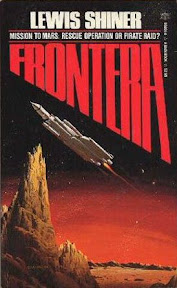 I originally picked up Shiner’s Deserted Cities of the Heart after I read one of his stories in the Mirrorshades cyberpunk anthology. It was cyberpunk that brought me back to Science Fiction in the mid 1980s, and I could not get enough of the stuff. Deserted was not SF, but it was more of a magical realism story. I still enjoyed it and Shiner seemed to me to represent a more ambitiously stylistic approach to modern spec fic, and I read Glimpses, another realistic fantasy which is one of the best books I’ve ever read.
I originally picked up Shiner’s Deserted Cities of the Heart after I read one of his stories in the Mirrorshades cyberpunk anthology. It was cyberpunk that brought me back to Science Fiction in the mid 1980s, and I could not get enough of the stuff. Deserted was not SF, but it was more of a magical realism story. I still enjoyed it and Shiner seemed to me to represent a more ambitiously stylistic approach to modern spec fic, and I read Glimpses, another realistic fantasy which is one of the best books I’ve ever read.
I recently decided to explore more Shiner and I bought Frontera and a couple of other books. My copy is signed by Shiner and the inscription says "for Charlene. Read this, too" and dated 1988. It only cost me three dollars at Alibris.
Frontera appears to be Shiner’s first book. Sometimes a first book suffers from fatal flaws, and this is no exception. Shiner throws a great deal of SFnal ideas at the book, but none of it seems to stick well. The story is a return trip to Mars from an earth taken over by multinational corporations after governments fail. I am guessing this notion of zaibatsu control of the world’s economy was a consensual shared vision among the cyberpunk authors. Gibson, Shirley, and Sterling all use it to some degree in their works from this period. Seeing this early cyberpunk world building this far out of context makes it read like a cliché, where at the time it was quite new, although not as fleshed out as in Gibson’s books that appeared at the same time.
The chief problem that I have with Frontera is the character development is not done very well. All the male characters have short names, and they speak, sound and act pretty much the same. I had trouble remembering which of them was which and it began to not matter much.
The technology is well done and based on good source material, but it reads like an uninteresting textbook. The science fictional element is based on mutants on Mars creating advanced devices that will revolutionize humanity. This kind of science is something that Greg Bear did much better in his book Moving Mars. I felt that this part of the book was added in just to have a plot line, and I found it uninteresting. Mutants appear constantly wherever there is reproduction, and just because Mars has a higher radiation rate, it is not likely that it is a special place to produce mutations.
Frontera is an interesting book. It appeared 10 years before the publishing houses began to ask for Mars books. If Shiner had held off, he could have been part of that surge of long boring books about the exploration of Mars, where it might have sold better
Frontera is a flawed first novel. Parts of it read well and it was not a waste of my time, but in the end, it is not one of Shiner’s best.